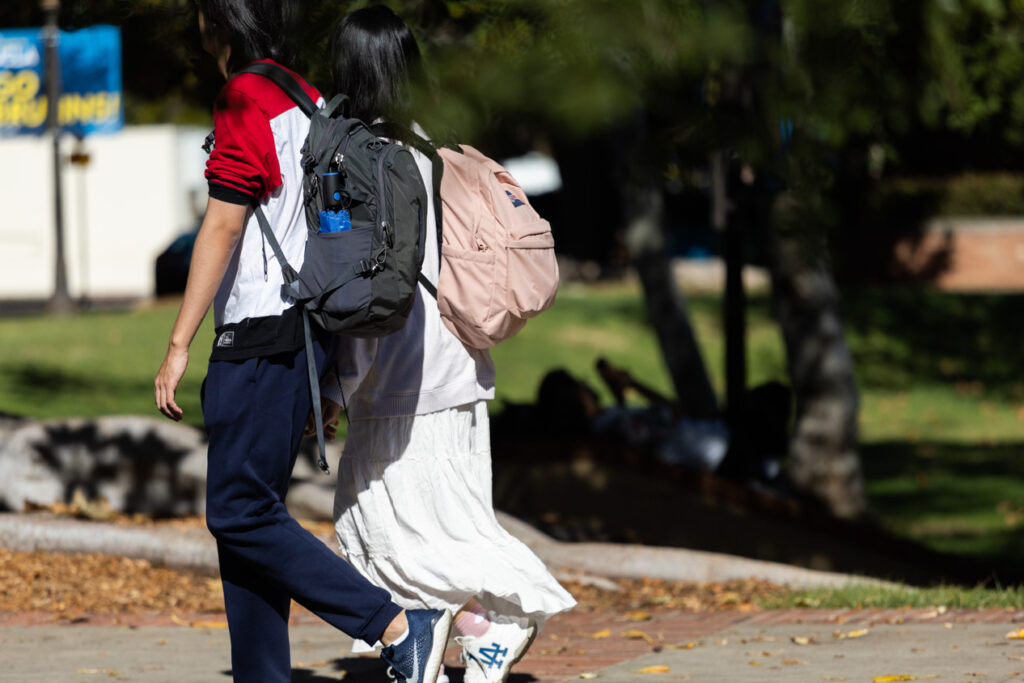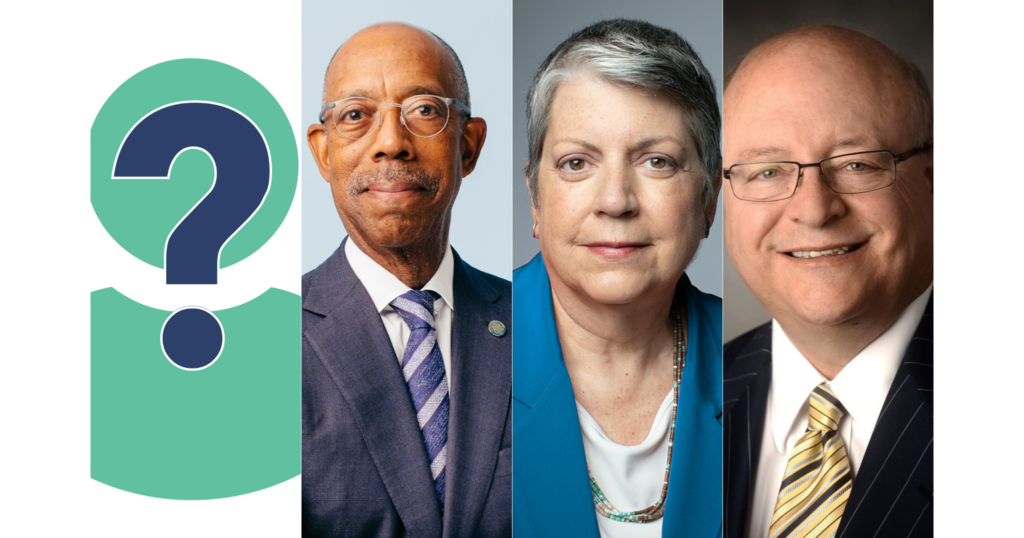
UCLA campus in Westwood on Nov. 18, 2023.
Credit: Julie Leopo / EdSource
This story has been updated with additional information on visa terminations at UC Riverside.
California campuses are searching for answers after dozens of international students had their visas terminated in recent days, a worrying trend for the state’s public colleges and universities, which enroll tens of thousands of international students and depend on the millions of dollars in tuition revenue they provide.
Concerns are also growing that the visa actions could result in a sizable number of international students choosing not to attend U.S. colleges in the fall.
Across the University of California’s 10 campuses, California State University’s 23 campuses and the state’s 116 community colleges, more than 80 current and former students have had their F-1 visas terminated, a number that could grow. In most cases, campus officials said the federal government, under new Trump administration policies, terminated the visas without explanation.
The cancellations are especially concerning to UC and CSU because the two systems combine to enroll about 50,000 international students, who make up significant enrollments in many graduate programs and pay tuition at much higher rates than California resident students. Including private universities, there are 154,000 international students in California, according to data from the SEVIS Data Mapping Tool, accounting for about 14% of all international college students in the U.S. and the most of any state.
The timing of the terminations is also concerning: Many prospective international students are currently deciding where they will attend in the fall, said Bernie Burrola, the vice president for international, community and economic engagement at the Association of Public and Land Grant Universities (APLU).
Burrola added that he’s worried there could be a chilling effect on international student enrollments.
“Students spend quite a bit of money when they come to university. Do they want to invest that time and money and then get a visa termination? I’m sure that calculus is happening around the world right now, with students weighing their options between a U.S. higher education and that of another country,” he said.
According to experts monitoring the terminations nationally, it’s possible the students had an infraction with law enforcement, even something as minor as a traffic violation. Nationally, there have also been reports that students are being targeted for involvement in pro-Palestinian protests.
The State Department, which handles student visas, did not return a request for comment Monday.
In recent interviews, Secretary of State Marco Rubio said the federal government will not cancel the “overwhelming majority of student visas” but is targeting students it believes “are supportive of movements that run counter to the foreign policy of the United States.” He also acknowledged that the government is also pursuing terminations that “are unrelated to any protests and are just having to do with potential criminal activity.”
Visas have been terminated for current or former students from at least seven UC and CSU campuses and one community college:
- Six students and six recent graduates at UCLA
- Seven students and five recent graduates at UC Davis
- Five students at UC San Diego
- Four students and two recent graduates at UC Berkeley
- Three students at UC Santa Cruz
- Two students and four recent graduates at UC Riverside
- One student at San Diego State
- An undisclosed number of students at San Jose State
- Six students at Santa Monica College
In total, a CSU systemwide spokesperson said the visas of 32 students had been revoked as of Monday, but did not disclose which specific campuses were affected.
Four students and two recent graduates at Stanford University have also had their visas terminated, showing the actions are also occurring at private institutions.
“We reiterate our strong support for all international students and scholars,” UC Santa Cruz Chancellor Cynthia Larive said in a message to her campus. “UC Santa Cruz is enriched by the contributions of our international community members, and we are fortunate to research, teach, and learn with and from such outstanding students and scholars.”
In fall 2024, the UC system enrolled about 35,000 international students, or about 11.5% of all students. About 20,000 were undergraduates and 15,000 were graduate students. CSU, in fall 2024, enrolled 13,718 international students, or about 3% of that semester’s enrollment. Of those students, 5,765 were graduate students.
Across California’s 116-campus community college system, 14,533 students had a student visa in fall 2024, or about 1% of the student body.
UC and CSU receive significant tuition revenue from international students, who are charged a nonresident supplemental tuition fee on top of the base tuition that is also charged to in-state students. During the 2022-23 academic year, UC received $1.1 billion in revenue from nonresident supplemental tuition charged to nonresidents, which includes both out-of-state and international students. CSU likely receives tens of millions of dollars annually in tuition from out-of-state students.
Concerns about that tuition revenue come as the universities also worry about federal threats to withhold funds for research and other purposes and a possible reduction in state dollars for UC and CSU because of budget constraints.
Higher education experts emphasized, though, that universities stand to lose more than just tuition revenue if international students choose not to attend. Burrola, the APLU vice president, noted that many graduate programs are “heavily dependent on international students” and that certain departments would be in jeopardy without those students, who often add value by working as teaching assistants leading discussion sections and being deeply involved in research.
Ted Mitchell, the president of the American Council on Education, an important lobby group for higher education, said it is “important for a host of reasons” that the United States remain a top destination for international students, “from the positive impact they make on our economy and cultural vibrancy to the way so many become ambassadors for the value of a U.S. education and our way of life.”
“It is important for international students to be treated fairly and afforded due process. It would be detrimental to the United States, both from an economic and academic standpoint, to chill the willingness of prospective international students to come here,” he said.
In most cases, students at UC and CSU who had their visas terminated were not given explanations. Officials at UC Davis, UC San Diego, UC Santa Cruz, and CSU officials at San Diego State said the federal government didn’t explain the rationale behind the terminations. UCLA Chancellor Julio Frenk offered some clarity, saying the termination notices at that campus “indicate that all terminations were due to violations of the terms of the individuals’ visa programs.”
The Associated Press reported that some students across the country have been targeted over pro-Palestinian activism, criminal infractions or even things as minor as a traffic violation.
Burrola said an emerging theme nationally is that students who received terminations might have “some kind of infraction” with law enforcement, sometimes minor ones. He added, though, that his understanding is based only on anecdotal reports and that APLU is seeking further clarification from the federal government. He said the group sent a letter to Secretary of State Rubio asking for a meeting “to better understand why this is happening.”
Mitchell of the American Council on Education penned a similar letter to Rubio and U.S. Homeland Security Secretary Kristi Noem, requesting a briefing on the terminations.
“Recent actions have contributed to uncertainty and impedes the ability of our institutions to best advise international students and scholars,” Mitchell wrote. “It is important institutions are in a position to reassure international students so they can continue to make exceptional contributions to their campuses, communities, and the nation.”


